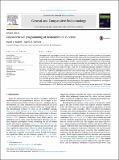Files in this item
Glucocorticoid programming of neuroimmune function
Item metadata
| dc.contributor.author | Walker, David J. | |
| dc.contributor.author | Spencer, Karen A. | |
| dc.date.accessioned | 2017-10-20T15:30:24Z | |
| dc.date.available | 2017-10-20T15:30:24Z | |
| dc.date.issued | 2018-01-15 | |
| dc.identifier | 250544456 | |
| dc.identifier | 878b6bdb-84d8-44a9-b4a3-6c9a46eb07f4 | |
| dc.identifier | 85025836562 | |
| dc.identifier | 000423013200013 | |
| dc.identifier.citation | Walker , D J & Spencer , K A 2018 , ' Glucocorticoid programming of neuroimmune function ' , General and Comparative Endocrinology , vol. 256 , pp. 80-88 . https://doi.org/10.1016/j.ygcen.2017.07.016 | en |
| dc.identifier.issn | 0016-6480 | |
| dc.identifier.uri | https://hdl.handle.net/10023/11895 | |
| dc.description | Work attributed to the ideas presented within this manuscript was supported by the BBSRC (Biotechnology and Biological Sciences Research Council, UK) under the EASTBIO doctoral training program [grant no. BB/J01446X/1], awarded to DJW. KAS was also part funded by a BBSRC grant [no. BB/L002264/1]. | en |
| dc.description.abstract | Throughout life physiological systems strive to maintain homeostasis and these systems are susceptible to exposure to maternal or environmental perturbations, particularly during embryonic development. In some cases, these perturbations may influence genetic and physiological processes that permanently alter the functioning of these physiological systems; a process known as developmental programming. In recent years, the neuroimmune system has garnered attention for its fundamental interactions with key hormonal systems, such as the hypothalamic pituitary adrenal (HPA) axis. The ultimate product of this axis, the glucocorticoid hormones, play a key role in modulating immune responses within the periphery and the CNS as part of the physiological stress response. It is well-established that elevated glucocorticoids induced by developmental stress exert profound short and long-term physiological effects, yet there is relatively little information of how these effects are manifested within the neuroimmune system. Pre and post-natal periods are prime candidates for manipulation in order to uncover the physiological mechanisms that underlie glucocorticoid programming of neuroimmune responses. Understanding the potential programming role of glucocorticoids may be key in uncovering vulnerable windows of CNS susceptibility to stressful experiences during embryonic development and improve our use of glucocorticoids as therapeutics in the treatment of neurodegenerative diseases. | |
| dc.format.extent | 9 | |
| dc.format.extent | 883073 | |
| dc.language.iso | eng | |
| dc.relation.ispartof | General and Comparative Endocrinology | en |
| dc.subject | Cytokines | en |
| dc.subject | Developmental programming | en |
| dc.subject | Glucocorticoids | en |
| dc.subject | Microglia | en |
| dc.subject | Neuroimmune | en |
| dc.subject | Stress | en |
| dc.subject | RC0321 Neuroscience. Biological psychiatry. Neuropsychiatry | en |
| dc.subject | BF Psychology | en |
| dc.subject.lcc | RC0321 | en |
| dc.subject.lcc | BF | en |
| dc.title | Glucocorticoid programming of neuroimmune function | en |
| dc.type | Journal item | en |
| dc.contributor.sponsor | BBSRC | en |
| dc.contributor.sponsor | BBSRC | en |
| dc.contributor.institution | University of St Andrews. School of Psychology and Neuroscience | en |
| dc.identifier.doi | https://doi.org/10.1016/j.ygcen.2017.07.016 | |
| dc.description.status | Peer reviewed | en |
| dc.identifier.grantnumber | BB/L002264/1 | en |
| dc.identifier.grantnumber | BB/L002264/1 | en |
This item appears in the following Collection(s)
Items in the St Andrews Research Repository are protected by copyright, with all rights reserved, unless otherwise indicated.

